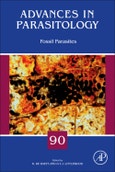Fossil Parasites, the latest edition in the Advances in Parasitology series established in 1963, contains comprehensive and up-to-date reviews on all areas of interest in contemporary parasitology, including medical studies of parasites of major influence, such as plasmodium falciparum and trypanosomes. The series also contains reviews of more traditional areas, such as zoology, taxonomy, and life history, which help to shape current thinking and applications.
Parasitism is a dominant life history strategy and we know it has existed for millions of years. Detecting parasitism in the fossil record is problematic because we rarely see direct evidence and usually must rely on indirect evidence to infer its existence. This unique volume takes a broad and systematic view of direct and indirect evidence for parasitism in the fossil record.
Please Note: This is an On Demand product, delivery may take up to 11 working days after payment has been received.
Table of Contents
- Evolution, Regulation, and Function of N-terminal Variable Region of Troponin T: Modulation of Muscle Contractility and Beyond
Jian-Ping Jin - Phosphatidylethanolamine Metabolism in Health and Disease
Elizabeth Calzada, Ouma Onguka and Steven M. Claypool - Microtubule Dynamics in Neuronal Development, Plasticity, and Neurodegeneration
Lorène Penazzi, Lidia Bakota and Roland Brandt - Fish Chromatophores-From Molecular Motors to Animal Behavior
Helen Nilsson Sköld, Sara Aspengren, Karen L. Cheney and Margareta Wallin - Molecular Breeding of Sorghum bicolor: A Novel Energy Crop
Reynante Ordonio, Yusuke Ito, Yoichi Morinaka, Takashi Sazuka and Makoto Matsuoka - Cell-Nonautonomous Mechanisms Underlying Cellular and Organismal Aging
Younes Medkour, Veronika Svistkova and Vladimir I. Titorenko - OSBP-Related Protein Family: Mediators of Lipid Transport and Signaling at Membrane Contact Sites
Henriikka Kentala, Marion Weber-Boyvat and Vesa M. Olkkonen








